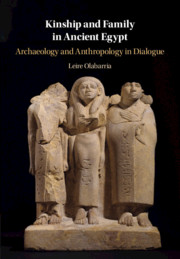Book contents
- Kinship and Family in Ancient Egypt
- Kinship and Family in Ancient Egypt
- Copyright page
- Dedication
- Contents
- Figures
- Acknowledgements
- Map of Egypt
- Part I Ancient Egyptian Kinship in Context
- One Introduction: Ancient Egyptian Kinship between Relatedness and Material Agency
- Two Understanding the Sources
- Three Setting the Terms
- Four Between the Emic and the Etic
- Five Dynamising Kin Groups
- Part II On Koinographic Analysis
- Appendix: ANOC Table
- Notes
- Bibliography
- Index
One - Introduction: Ancient Egyptian Kinship between Relatedness and Material Agency
from Part I - Ancient Egyptian Kinship in Context
Published online by Cambridge University Press: 26 February 2020
- Kinship and Family in Ancient Egypt
- Kinship and Family in Ancient Egypt
- Copyright page
- Dedication
- Contents
- Figures
- Acknowledgements
- Map of Egypt
- Part I Ancient Egyptian Kinship in Context
- One Introduction: Ancient Egyptian Kinship between Relatedness and Material Agency
- Two Understanding the Sources
- Three Setting the Terms
- Four Between the Emic and the Etic
- Five Dynamising Kin Groups
- Part II On Koinographic Analysis
- Appendix: ANOC Table
- Notes
- Bibliography
- Index
Summary
Chapter 1 discusses the use of archaeological and anthropological theory in Egyptology, characterised as an area study in need of analytical methods from other disciplines. Kinship and marriage are presented as a case study of how philological and archaeological approaches can be productively woven together through the use of two theoretical models, processual kinship and material agency, applied mainly to stelae from the Middle Kingdom.
A processual understanding of kinship needs to be framed within the emergence of culturalist critiques to kinship theory such as new kinship studies. This approach conceptualises kinship as a performative, context-bound sociocultural phenomenon and proposes ‘relatedness’ as its main analytical category. Material agency explores how objects have an impact on people, on other objects and on their surrounding landscapes. That entanglement can be fruitfully analysed through notions such as enchantment, distributed personhood, or object biographies. By virtue of these approaches, stelae are understood as objects that do not just represent reality, but they rather create a reality that embodies perceptions of the social fabric.
Keywords
- Type
- Chapter
- Information
- Kinship and Family in Ancient EgyptArchaeology and Anthropology in Dialogue, pp. 3 - 23Publisher: Cambridge University PressPrint publication year: 2020

